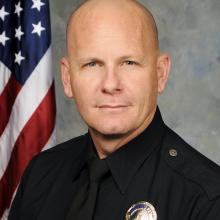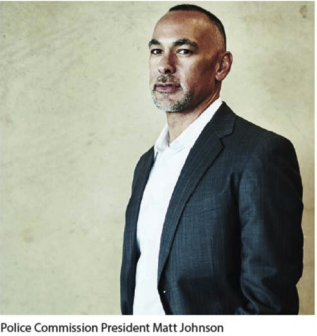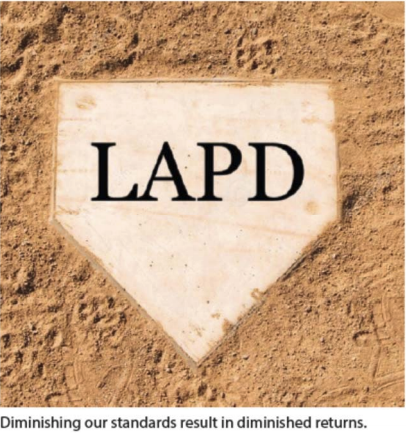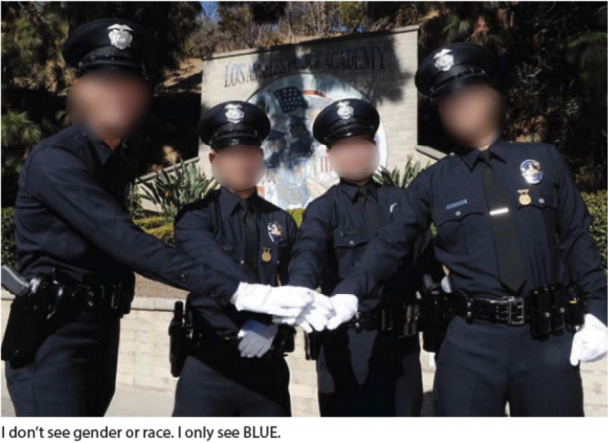Title
Bleeding Blue - March 2017

Body
How many inches?
At the Jan. 17th Police Commission meeting, Police Administrator Arif Alikhan presented a report relative to the Blake Justice Consent Decree for Fiscal Year 2015–16. Because the Commission meetings have turned into such chaotic sideshows, not much was presented in the way of the report. However, Alikhan made a few remarks, but nothing too earth-shattering. And Police Commission President Matt Johnson’s response? He accepted the report but wants a follow-up done for some additional information. In particular, he wants to know the most recent command staff promotions, specifically the recently vacated Deputy Chief position in South Bureau (in reference to the departure of Deputy Chief Bill Scott). In addition, he wanted to know the efforts the Department has made to “ensure diversity exists in all ranks and specialized units.” He was “disappointed” with the lack of diversity in the last few graduating recruit classes and concerned about how DROP will affect the demographics of the Department. Alikhan brought him somewhat back to reality in advising him that many factors can affect attrition, of which DROP is but one.

At what point do the best qualified get recognized? This is a very diverse Department. Opportunities abound for every gender and ethnicity. Sure, there is cronyism, but it has more to do with who you know than what ethnic category you fall into. But Johnson doesn’t want to hear that. There was no mention of what qualifications are necessary to be an effective officer or what efforts we make with respect to recruitment or hiring to get the most qualified candidate.
Diminishing our standards result in diminished returns.

I would like to share a story with you that someone sent to me regarding the legendary baseball coach John Scolinos. He was a college coach for over 40 years and became a public speaker at baseball conventions upon his retirement. At 78 years old, he would come out on stage wearing dark polyester pants, a light blue shirt and a string around his neck from which home plate hung—a full-sized, stark-white home plate. He would speak for 25 minutes or so, without acknowledging his strange neckwear.
Then finally he would say, “You’re probably all wondering why I’m wearing home plate around my neck. I may be old, but I’m not crazy. The reason I stand before you today is to share with you baseball people what I’ve learned in my life, what I’ve learned about home plate in my 78 years.”
“Do you know how wide home plate is in Little League? After a pause, someone offered, “Seventeen inches?” More of a question than an answer. “That’s right,” he said.
“Now, how many high school coaches do we have in the room?” Hundreds of hands shot up, as the pattern began to appear. “How wide is home plate in high school baseball?
“Seventeen inches,” they said, sounding more confident. “You’re right!” Scolinos barked. “And you college coaches, how wide is home plate in college?” “Seventeen inches!” they said, in unison. “Any Minor League coaches here? How wide is home plate in pro ball?” They shouted, “Seventeen inches!”
“Right! And in the Major Leagues, how wide is home plate?
“Seventeen inches!”
“SEV-EN-TEEN INCHES!” he confirmed, his voice bellowing off the walls. “And what do they do with a big-league pitcher who can’t throw the ball over 17 inches?” Pause. “What they don’t do is this: They don’t say, ‘Ah, that’s OK, Jimmy. You can’t hit a 17-inch target? We’ll make it 18 inches or 19 inches. We’ll make it 20 inches so you have a better chance of hitting it. If you can’t hit that, let us know so we can make it wider still, say 25 inches.’”
Pause. “Coaches…” pause, “… what do we do when our best player shows up late to practice? When our team rules forbid facial hair and a guy shows up unshaven? What if he gets caught drinking? Do we hold him accountable? Or do we change the rules to fit him? Do we widen home plate? He turned the plate toward himself and, using a Sharpie, began to draw something. When he turned it toward the crowd, point up, a house was revealed, complete with a freshly drawn door and two windows. “This is the problem in our homes today. With our marriages, with the way we parent our kids. With our discipline. We don’t teach accountability to our kids, and there is no consequence for failing to meet standards. We widen the plate!”
Pause. Then, to the point at the top of the house he added a small American flag. “This is the problem in our schools today. The quality of our education is going downhill fast and teachers have been stripped of the tools they need to be successful, and to educate and discipline our young people. We are allowing others to widen home plate! Where is that getting us?”
Silence. He replaced the flag with a cross. “And this is the problem in the church, where powerful people in positions of authority have taken advantage of young children, only to have such an atrocity swept under the rug for years. Our church leaders are widening home plate for themselves! And we allow it.”
“And the same is true with our government. Our so-called representatives make rules for us that don’t apply to themselves. They take bribes from lobbyists and foreign countries. They no longer serve us. And we allow them to widen home plate, and we see our country falling into a dark abyss while we watch.”
At a baseball convention they learned something far more valuable than just baseball. From an old man with home plate strung around his neck, they had learned something about life, about themselves, about their own weaknesses and about their responsibilities as a leader. They had to hold themselves and others accountable to that which they knew to be right, lest our families, our faith and our society continue down an undesirable path.

“If I am lucky,” Coach Scolinos concluded, “you will remember one thing from this old coach today. It is this: If we fail to hold ourselves to a higher standard, a standard of what we know to be right; if we fail to hold our spouses and our children to the same standards, if we are unwilling or unable to provide a consequence when they do not meet the standard; and if our schools and churches and our government fail to hold themselves accountable to those they serve, there is but one thing to look forward to….”
With that, he held home plate in front of his chest, turned it around and revealed its dark black backside, “… dark days ahead.”
His message was clear: “Coaches, keep your players—no matter how good they are—your own children, your churches, your government and, most of all, keep yourself at 17 inches.”
We are living this now. The plate is being widened in many respects. We no longer pay attention to qualities that make for successful police officers. Military service, leadership traits, a commitment to stewardship, demonstrated maturity and athletic prowess are all desirable. Where is the inquiry into how we reach out to our returning military veterans or recruit on college campuses? Apparently, none of this matters. Accomplishments and demonstrated success fall by the wayside to make room for being the desired color or gender. I don’t know of an officer who cares one whit about what color or gender their partner is. But when the heat gets turned up, we all want a competent partner who we can rely upon. Matt Johnson has no idea what it takes to be a cop. His idiotic questions only serve to confirm our initial assessment of his lack of qualifications to serve as a policymaker for this Department.
And this, my friends, is what our Department has become and what is wrong with it today, and how to fix it...
“Don’t widen the plate.”
If you have any questions, feel free to email me at [email protected] or contact me at (805) 208-3103.









